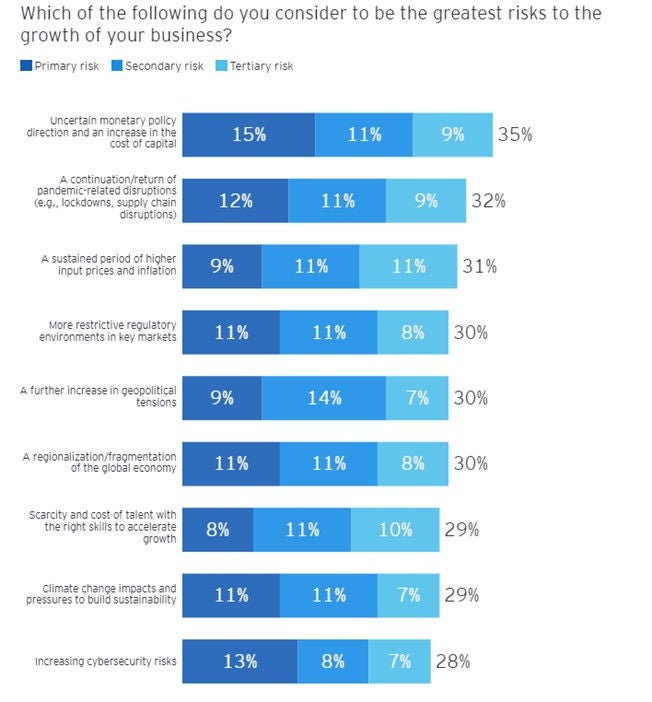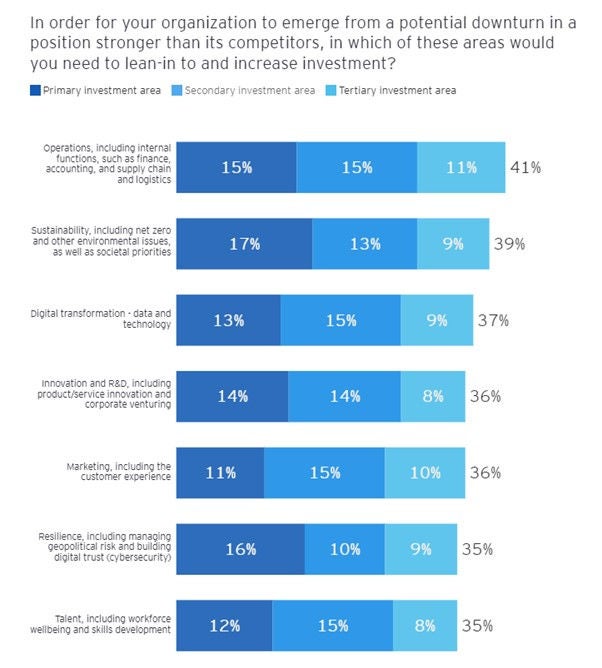EY refers to the global organization, and may refer to one or more, of the member firms of Ernst & Young Global Limited, each of which is a separate legal entity. Ernst & Young Global Limited, a UK company limited by guarantee, does not provide services to clients.

EY survey shows how CEOs are using current crisis to build resilience for the next disruption
The latest winter economic forecast for 2023 by the European Commission presents an upbeat outlook for growth and slightly lower inflation projections. As per the revised estimations, the EU and the euro area are now both expected to close off last year with an economic growth of 3.5%. For 2023, the European economy is set to narrowly escape the recession that was predicted back in autumn. GDP is projected to increase by 0.8% this year and 1.6% in 2024. Furthermore, headline inflation in the EU is expected to drop from 9.2% in 2022 to 6.4% in 2023 and then to 2.8% in 2024.
Against this backdrop, the January 2023 EY European CEO Outlook Pulse survey finds that while the majority of European CEOs are expecting a global slowdown, 52% have reason to expect positive developments on a longer time horizon. Since autumn, the EU economy has seen a number of positive developments. There has been some respite in the form of fading pressures from gas energy prices driven by a sharp fall in gas consumption and ongoing diversification of supply sources. Despite the energy shock and ensuing record high inflation, the economic slowdown in the third quarter was less severe than originally anticipated, while the EU economy remained stable in the fourth quarter, instead of contracting by 0.5% as expected earlier in autumn. The labour market also remained robust, with the unemployment rate in the EU holding steady at its all-time low of 6.1% in December. Additionally, a downward trend in inflation rates over the course of three months suggests that the peak has passed.
However, the EU economy remains afflicted by a range of challenges. The high cost of energy still poses a challenge to both consumers and businesses, and more than 90% of the items in the HICP basket are experiencing price hikes that are above average. These inflationary pressures are spreading across various sectors. Consequently, monetary tightening is expected to persist, which may weigh on investment activities.
According to the EY survey, approximately 35% of European CEOs consider uncertain monetary policy and rising cost of capital as the biggest challenge to growth. With China reopening, supply chain pressures have somewhat eased, and only 32% of European CEOs now regard supply chains as the main issue, a decrease from 41% in the October survey. High inflation continues to be a concern for 31% of European CEOs, but other upside risks are starting to become dominant. Market fragmentation across the global economy and restrictive regulatory policies are now viewed by 30% of European respondents as obstacles to business growth. Tight labor market conditions have been identified as a significant impediment to business growth by 29% of European CEOs, with the expectation that this could ultimately lead to stronger-than-anticipated wage pressure.

Source: The January 2023 EY European CEO Outlook Pulse survey
As they look to the future, many CEOs are aware of the need for new and sustainable approaches to build resilience and take advantage of emerging opportunities. In response to this, European CEOs are utilizing the current downturn to prepare for the next disruption. The survey outlines five specific directives that can help guide the way forward.
1. Invest in operations: Mindful of the fact that risk isn’t only about extraordinary events but could also be inherent in the day-to-day operational set-up of the business, 41% of European CEOs identify internal operations, such as finance, compliance and cybersecurity, as a top priority area of investment.
2. Accelerate digital transformation: Likewise, digital transformation helps businesses improve their operational efficiency, increase their agility and responsiveness, and create new business models and revenue streams. By adopting digital tools such as cloud computing, data analytics, artificial intelligence, and mobile applications, businesses can streamline their operations, enhance their customer experience, and gain a competitive advantage. Already accelerated through the COVID-19 pandemic, 37% of European CEOs are looking further to embrace new technologies and invest in digital transformation to emerge stronger from this downturn.

Source: The January 2023 EY European CEO Outlook Pulse survey
3. Develop a strong ESG strategy: European CEOs have identified sustainability, encompassing environmental issues such as achieving net zero, as well as addressing societal priorities, as a crucial area that requires greater investment. Within the next six months, 39% of European CEOs consider pursuing sustainability as an important strategic action.
4. Nurture talent: As a result of the Great Resignation and "quiet quitting," many talented individuals have started to move around, and CEOs are now more aware than ever of the importance of retaining and upskilling their employees for the future. Offering attractive career paths, hybrid working options, ongoing opportunities for growth and learning, and value-oriented work is crucial in today's market. The survey found that 35% of European CEOs will invest more in their people over the next six months, of which 67% believe that hybrid working is increasingly vital for reducing employee turnover and attracting new talent. Additionally, more than half (51%) of the CEOs agree that during a downturn, there is a greater need to focus on workforce wellbeing, including by addressing issues such as childcare and mental health.
5. Portfolio rebalancing: Finally, as CEOs navigate through these uncertain times, portfolio rebalancing is expected to become a crucial focus. This will require them to assess their core business, determine their focus and ultimately identify opportunities to create value by divesting non-core assets. According to the survey, 93% of European CEOs consider prioritizing restructuring opportunities as an important initiative within the next six months.
Glenn Fenech is a Manager within EY’s Valuation, Modelling and Economics sub-service line. More details on the 2023 EY European CEO Outlook Pulse survey available from www.ey.com/en_gl/ceo/ceo-outlook-global-report
Summary
EU CEOs optimistic that a recession will be short lived.



